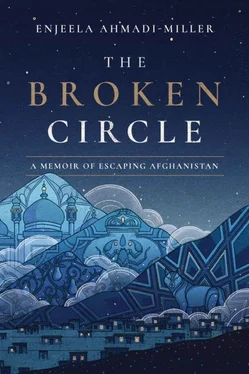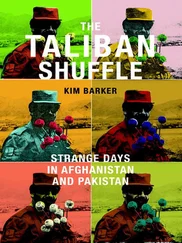He taught me to cook chalow with kormas, and kofta, and lamb-chicken kabobs, and Kabuli pulao, and other dishes. We spent the days exploring and spent the evenings cooking and staying up late playing cards.
We had been there nearly a week, and Ram had still not returned. Padar said he would arrive when he was ready and not to worry. It was a rainy day, so we decided to stay in our room and play fis kut while Padar went out for some fresh fruit. It’d been raining all the previous night, and we felt cooped up for the first time since the barn as we sat in a circle on the floor holding our cards.
For the first hour, Zia won every hand, racking up points and ridiculing Zulaikha’s play at every opportunity.
“You’re cheating, that’s why you win so much,” she said, holding her hand to her chest so none of us could see her cards.
“I don’t need to cheat to beat you.” He threw down a trump, gaining more points. “All I have to do is wait for you to make a stupid move.”
“Like that one,” Laila said, picking up his discard and throwing down a three of a kind.
I laughed. Laila was right; Zia did make stupid moves at times. But I also knew that at one time or another over the last two years, each of us had cheated at this game.
“What are you laughing at?” Zia asked, his face turning a little red, thinking that I might be making fun of him too.
“You’re a cheater,” I said, pointing at Zia. “You’re a cheater.” I pointed at Zulaikha. “You’re a cheater.” I pointed at Laila.
Zia tapped his chest with indignation, his cheeks blanching. “Who, me? I never cheat.”
That made me laugh even harder. Laila pushed me over on my back. “You’re the biggest cheater of them all.”
“And you’re all stupid,” I said through giggles, “because you don’t even know all the ways I win at this game while you’re not looking.”
Zulaikha threw her cards at me. Then Zia did the same, and frustrated, Laila jumped on me, trying to pin my arms to the floor. “You wretched thing,” she said. “I’ve had enough of you.”
“You idiot,” I said, trying to push her off me. Zulaikha grabbed one of my wrists so they could hold me down and start slapping me. “Help me, Zia. They’re going to kill me.” He grabbed Zulaikha’s wrist, trying to pry it off me. I screamed when my wrist twisted; Zulaikha screamed; Zia shouted when someone pulled his hair.
Just then the door burst open. And we froze.
“What’s going on here?” Padar said. “Get your hands off each other, before I slap them off.”
Our wrestling ceased. Laila jumped off me. We all stood facing him.
“Haven’t I taught you anything about how to treat one another?” He looked exasperated, disappointed. He set his bags of groceries on the table. He paced for about a minute, then stopped. “Get your coats. I want to show you something.”
We gathered ourselves. I put on my new embroidered sweater with the colorful flowers. The rain had tapered off, and we each had an umbrella that kept the gentle sprinkle off us. We followed Padar through the narrow streets that were like canyons, the buildings were so tall. He walked quickly, turning into one plaza that fed into another, where we passed palaces, temples, and street vendors with their wares laid out on the bricks. Padar turned into a building that at first looked like so many of the others—white pillars across the front, steps leading up to a platform; the entrance was flanked by carved stone elephants, a favorite local deity.
“This is the Garden of Dreams,” he said.
Up the front walk, it soon became evident this wasn’t just another temple. The perfectly manicured lawns were bordered by low shrubs and colorful flowers, with slate walkways that were laid in perfect geometric patterns. This reminded me of the Paghman Gardens in Kabul, one of my favorite places. We entered through the archway at the top of the stone stairs and passed through an iron gate onto a broad walkway. Padar led us beside a lily pond, along a brick walk, past a set of half-circular steps that led down to a grassy amphitheater. A path of stones was set in a lawn that led to a brick-and-glass outdoor café, but we didn’t stop for tea. We followed Padar deep into the garden, into an alcove surrounded by a decorative brick wall with coping painted white.
Trees hung over the walls, and neatly trimmed bushes grew along the edges, with a diamond-shaped fountain in the middle, water trickling soothingly out of its top into the placid pool below. It was a lush green oasis of privacy and charm.
Padar motioned for all of us to sit down on one of the white benches. It was hard and cold but none of us complained. He paced in front of us.
“What do you see here,” he said, expecting that we would understand the lesson he was to teach us.
“It’s quiet,” Laila said.
“It’s beautiful,” Zulaikha said.
I could see that these weren’t the answers he was expecting. “Look carefully, children.” We each eagerly searched the garden, the peaceful surroundings. This was his way of teaching us about life, but his message was lost on me. “Look at the trees,” he said.
“They touch each other,” I said.
“Yes, that’s right, Enjeela.” He motioned toward the two large ones in front of us, where the branches were so close to each other as they reached over the wall, they intermingled. “Do you see them fighting?”
“How can they fight?” Zia said. “They can’t even talk.”
“They’re like a poem, Zia,” he said, raising his hand in the air toward them. “Their actions speak to us without words.”
“They’re symbols,” Laila said.
“Of what?” Zulaikha asked.
“They can touch,” he said. “Yet they don’t fight. They get along.”
“So we’re supposed to behave like trees,” Zia said.
“We’re supposed to learn from the trees.” He swept his arm around. “Look at the plants, how close they are to each other. Yet they give room for each other. They don’t fight or complain. If you look close, you can see love everywhere.”
“So we’re supposed to just give way to each other,” Laila said.
“Yes, that’s it.” He pointed at her with a genuine enthusiasm. “We’re bone of bone of each other. Of all the people we are to trust, it’s each other.” He waved his hands back up toward the trees. “What you see is what love looks like. They can touch each other, yet they don’t irritate or enrage each other. All throughout the world, love speaks to us, what it means to cherish and be kind and to respect each other. If we miss the message, we will get lost. We will lose out on what’s important.”
That all made sense. Even though we fought like dogs and cats sometimes, I had to think that there was not anyone I was closer to than Zia, Laila, and Zulaikha. It didn’t matter that I hardly agreed with them about many things, but I did love them. We were blood. We were family. That was the meaning of this whole journey to India. To be a family. To be together. I saw for the first time the meaning of the trees touching and getting along.
It was dark by the time we made it back to the hotel and to Padar’s room. He unlocked the door, and we all piled in. Laila was first, but she stopped cold, as if she’d seen something dangerous. Glancing around from behind her, I spotted across the room the faint glow of a cigarette. Someone puffed on it, making it pulse brighter in the dark. The tobacco smelled familiar.
Padar clicked on a lamp.
“Hello, brother,” a smiling Ram said, puffing elegantly on his cigarette as if he’d been relaxing all day, waiting. “Hello, children.”
“Ram,” I yelled. “Where’ve you been?”
He nodded toward the table. “Taking care of business so you guys can go home.”
Читать дальше












